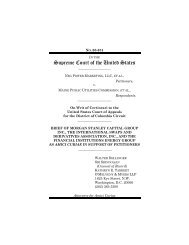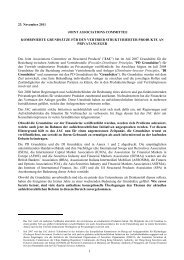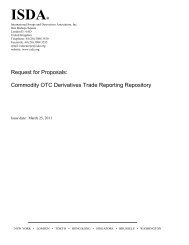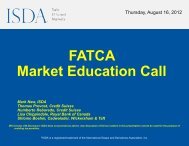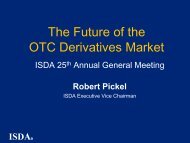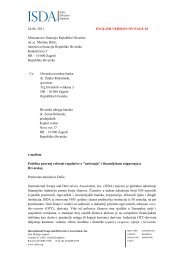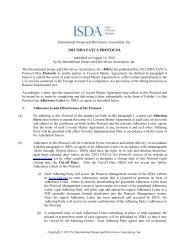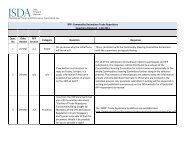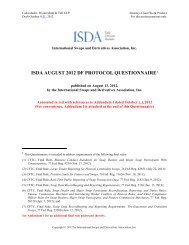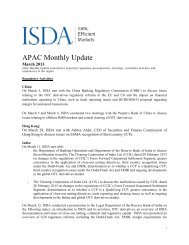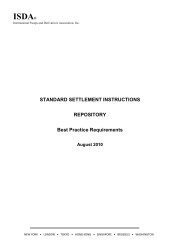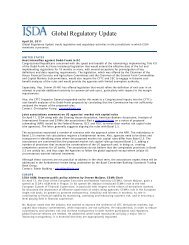Petition for a Writ of Certiorari - Snohomish. - ISDA
Petition for a Writ of Certiorari - Snohomish. - ISDA
Petition for a Writ of Certiorari - Snohomish. - ISDA
You also want an ePaper? Increase the reach of your titles
YUMPU automatically turns print PDFs into web optimized ePapers that Google loves.
19The Ninth Circuit’s standard makes no sense even if marketmanipulation caused the spike in prices. If market manipulationhas created an artificial shortage, the most effective remedy willbe to encourage other market participants to alleviate that shortageby increasing the level <strong>of</strong> market supply. That response will7minimize the harm caused by the manipulation and reduce thewrongdoers’ illicit gains, thereby reducing the temptation to engagein market manipulation. The surest means <strong>of</strong> preventingthat desirable response will be to deny benefits (by refusing toen<strong>for</strong>ce their contracts) to those who contract to sell moreelectricity during periods <strong>of</strong> market turmoil.Third, the Ninth Circuit’s decisions will lead to enormouslitigation costs. When the Mobile-Sierra doctrine is properlyapplied, litigation over long-term supply contracts is rare andrelatively cheap. The principal issue to be decided is whetherthe disputed contract is valid. That issue frequently can be decidedmerely by examining the contract or, in unusual cases, thebehavior <strong>of</strong> those who were involved in negotiating the contract,to determine if they acted deceptively or in bad faith. The NinthCircuit’s decisions will expand both the circumstances in whichbuyers will be motivated to initiate litigation to escape theircontractual commitments, and the scope and likely cost <strong>of</strong> that7See Charles Augustine, Joseph Cavicci & Joseph Kalt, Competitionand Regulation, Part III, Tensions Evolve Between Competition andRegulation, ELECTRIC LIGHT AND POWER (Jan. 2006), available at http://uaelp.pennnet.com/Articles/Article_Display.cfm?Section=ARTCL&ARTICLE_ID=247218&VERSION_NUM=2&p=34 (“[A]s our antitrustprinciples recognize, if a dominant seller, A, unlawfully exercises marketpower, its prices can properly be judged to be unjust and/or unreasonable.At the same time, however, these principles recognize that A’sexercise <strong>of</strong> market power will generally pull up the prices <strong>of</strong> otherwisefaultless sellers B, C, D . . . Z, and will induce expansions in thosesellers’ supplies. In market-driven price regimes, this is desirable: Theresponses <strong>of</strong> B, C, D . . . Z dampen the impact <strong>of</strong> A’s conduct and holdoverall price levels lower than they would be if these other sellers did notrespond. B, C, D . . . Z’s prices may be ‘high’ but B, C, D . . . Z’sresponses help consumers.”).



